Best Vitamin C For 2 Year Old
With such a huge variety of baby and toddler vitamin supplements available to buy, it can be hard knowing exactly what your child needs and if they really need them. While your tot should be eating a balanced diet full of all the fruits and vegetables they need to get their essential nutrients, babies and young children can be quite fussy when it comes to food and it's important your baby or toddler gets all the essential vitamins they need to ensure they grow and develop properly. 'Vitamins and minerals are essential for normal growth and development particularly in the early years as your child's body is growing quickly and they're used for chemical reactions within the body,' says Julie Clark, registered Family Nutritionist and author of Baby-Led Weaning Step by Step. 'Their key roles are to help the body use up the calories in food, process fat, protein and carbohydrates, and help in the repair and building of cells and tissues.' With all this in mind, a good variety of different foods, and particularly colours of foods, in your child's diet will ensure many of the nutrients can be crossed off the list.How children can get their vitamins and nutrients through food
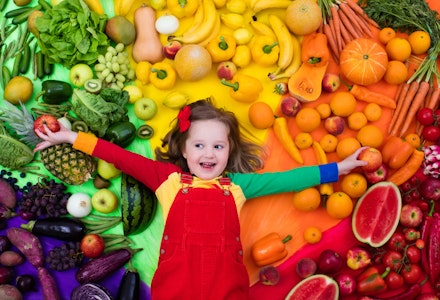
When your baby is born, he has his own stock of iron and zinc, which have been passed onto him while in the womb. However, by the time he's six months, those stocks are running out. 'This is why you need to start weaning onto food at this age,' says dietician Jo Travers from thelondonnutritionist.co.uk. 'Milk does not provide enough nutrients for your baby, which is why you need food.' From the age of six months, your baby needs 7.8mg of iron. 'While formula is fortified with nutrients, including iron, you should also ensure that you wean him using iron-rich foods such as meat, dark poultry meat, beans, pulses and dark green leafy vegetables,' says Jo. It's worth remembering that calcium can prevent the absorption of iron so giving him milk at the same time as a plate of baked beans could potentially limit the iron content of the beans. To counter this, ensure you serve up foods containing vitamin C alongside them as they can aid the absorption of iron. This nutrient is needed to help absorb iron from food. 'While calcium is a very important nutrient for ensuring your baby builds up strong bones and teeth, it can also inhibit the absorption of non-haem iron,' says Jo. 'This comes from vegetable sources such as spinach or kale. However, you can boost absorption by eating foods containing vitamin C, such as oranges, peppers, kiwis and broccoli.' Vitamin C also helps to strengthen your baby's immune system, which can be quite weak in the early years of his life. 'Children aged between 12 months and 2 years often go through a picky phase and tend to eat less vegetables and fruits,' says Julie. This is probably one of the most crucial vitamins needed. 'It's made when sunlight hits the skin, but because the levels of sunlight in the UK can be quite low, it's vital that children aged between six months and five years take a supplement drop containing vitamin D,' says Julie. 'However, babies who are fed infant formula will not need vitamin drops until they are receiving less than 500ml (about a pint) of infant formula a day, as these products are fortified with vitamin D.' There are a few dietary sources of vitamin D – fortified breakfast cereals and margarine – but NHS advice states that you should boost your baby's sources with a supplement. Essential for eye health, normal growth and development and the immune system, vitamin A (the beta carotene variety) can be found in orange and yellow coloured foods such as carrot, butternut squash and mango. 'Animal sources of vitamin A (known as retinol) include meat and dairy,' says Jo. Dietitian Dr Carrie Ruxton, says: "Omega-3s are important at any age. Several studies have found that children exposed to optimal intakes of omega-3s in the womb or infanthood tend to have better cognitive function, while a recent randomised control trial showed the specific combination of omega-3 and 6 in Equazen is as effective as prescription medicines for controlling the symptoms of Attention Deficit Hyperactivity Disorder (ADHD). Parenting expert Lorraine Thomas, founder of the Parent Coaching Academy, says: "Science has found that a blend of omega-3 and 6 in the diet help with behavior, memory and, as a result, learning. They also help with sleep patterns according to researchers from Oxford University. They found children who had a diet rich in omega-3 and omega-6 slept for longer and woke up less in the night compared to those children who did not have a diet rich in omega-3 and omega-6." Equazen Baby supplement is a source of Omega-3 and 6, and is suitable for ages 6 months - 3 years. If you are concerned your tot might not be getting all the nutrients they need from food, you may want to give your baby supplements as well as feeding them a healthy and balanced diet. Depending on where you live, you may be able to get free vitamin drops for your child from Sure Start Centres. Some families on low incomes are eligible for Healthy Start vitamins. Otherwise, we've put together a list of the best over the counter vitamins to buy. Always talk to your pharmacist for advice before purchasing. Iron
Vitamin C
Vitamin D
Vitamin A
Omega-3 and 6
What are the best vitamin supplements for my child?
Natures Aid Mini Drops Multi-vitamin for Infants and Children
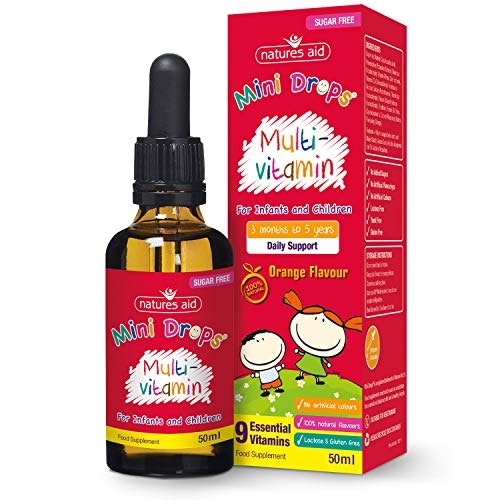
Designed specifically for babies, infants and children aged 3 months - 5 years, these drops are easy to use and can be added to food or drink for an easy, fuss free way of giving your baby their vitamins. Made up of nine different essential vitamins including vitamins C, D, B1, B2 and Niacin to support normal energy production. It comes in a tasty orange flavour and is sugar-free.
One mum said: 'I've never seen a kid so keen on taking vitamins! My son prefers this over the gummy ones so I keep buying them. They do have a very strong vitamin b12 smell to it, but the orange flavor masks it well. My son is thriving and that's the most important thing.'
Vitabiotics Wellbaby Multi-Vitamin Liquid
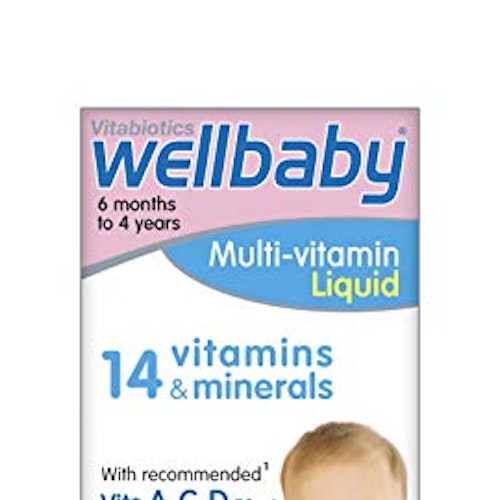
Made for infants ages 6 months to 4 years old, this mineral liquid form of multivitamin supplement contains vitamins A, C and D to help the growth and development of bones in children. Free from artificial sweeteners, colours or flavours.
One reviewer said: 'After using this product, my son has somehow managed to stay clear of any bugs/coughs/colds - he is a premie which meant he has been very prone to get any little bugs.
'Starting nursery was an absolute nightmare for me as he would be very sick almost every week, I had this recommended by another mum from the NICU my son had been at and whether it's these vitamins or just a combination of him being older and more immune I cannot say but it's safe to say I'll continue with these for a very long time!'
Abidec Kid Multivitamin Syrup
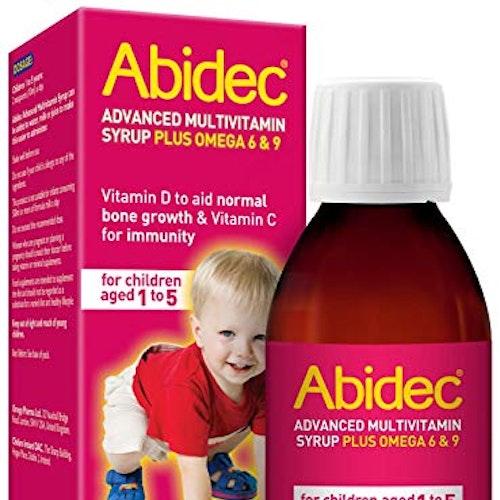
Made for kids aged 1-5 years, this multivitamin syrup has a tasty raspberry flavour, making it pleasant for your tot and it can be easily added to their milk, water or juice. It contains vitamin D3 needed for the normal development of bones in children
and helps support the maintenance of normal teeth too.
One mum says: 'My 3yo loves it but she's got really low standards when it comes to food. It's 10ml per day so it lasts 15 days and you end up needing 2 bottles a month. This makes it more expensive than getting one bottle of Vitabiotics "well baby" a month. The vitamin concentration on this seems to be higher than what's in "well baby" so I buy both Multivitamins and alternate the month I give her. All in all, I'm happy with the vitamin D dosage she's getting now.'
Natures Aid Vitamin C Mini Drops
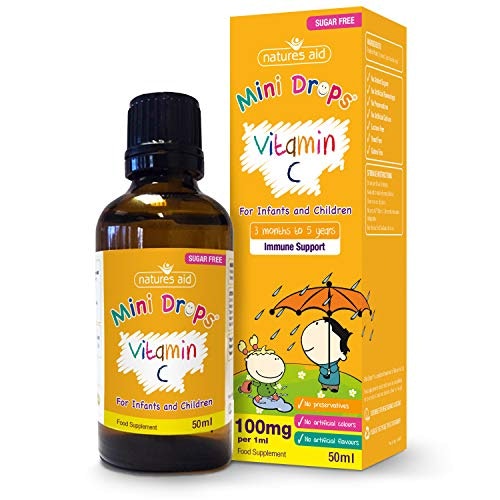
Vitamin C helps to support collagen formation, the normal function of bones, cartilage, gums and teeth and there is 100mg of vitamin C per daily serving, to support the normal function of the immune system. Designed for babies and children aged 3 months to 5 years, this easy to use liquid can simply be added to their food or drink.
One reviewer says: 'These are great. And, I can easily hide it in my son's water bottle. I don't add juice. My son only likes to drink plain water. And, these drops have got a subtle orange flavour. But, not strong at all. Extremely easy to use, 10 drops in a cup or bottle of water, or food.
'The only thing is; you do have to shake the drops out, especially from when the bottle becomes half empty. Other than that, the drops can be quite slow to come out. Good price, and I've found that every day the bottle seems to last me a month.'
Baby Ddrops
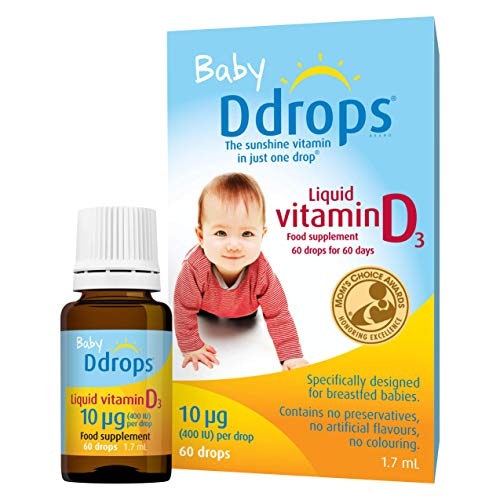
The UK Department of Health recommends that all babies and children up to the age of 5 should take a vitamin D supplement, making this a good one to add to your baby's diet. With an easy-to-use liquid drop there's no need for measuring devices or syringes. Recommended daily 10 µg (400 IU) in just one tasteless drop.
One mum said: 'It is comforting to know that your baby is getting the right nutrients, these vitamin D drops are sunshine in a bottle. I would give it 5 stars if the dropper was easier to administer, sometimes you get more than one drop and have to clean it off and drop again!
'I was a bit confused that the bottle was so big for such a small amount too, but I understand that 60 drops isn't actually that much and a smaller bottle would probably make it more difficult to administer.'
More popular articles to read next
-
Most read: 9 ways to boost your baby's immune system
-
Most read: Your go-to guide to taking supplements while pregnant
Just so you know, whilst we may receive a commission or other compensation from the links on this website, we never allow this to influence product selections - read why you should trust us
Source: https://www.motherandbaby.co.uk/baby/weaning/baby-and-toddler-vitamins/

